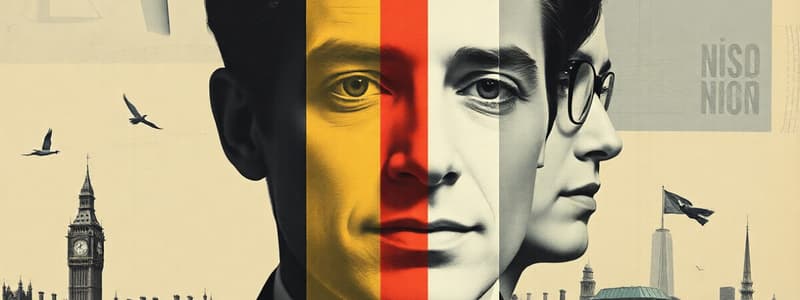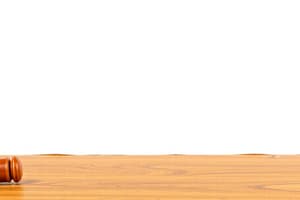Podcast
Questions and Answers
What does the second provision of Article 15 prohibit?
What does the second provision of Article 15 prohibit?
- Discrimination based on political views
- Discrimination based on religion, race, caste, sex, or place of birth (correct)
- Discrimination based on economic status
- Discrimination only by the State
Which of the following is an exception to the non-discrimination rule in Article 15?
Which of the following is an exception to the non-discrimination rule in Article 15?
- Special provisions for socially and educationally backward classes (correct)
- Special provisions for all citizens
- Reservations for wealthy citizens
- Restrictions based on nationality
What special provision can the state make for women and children?
What special provision can the state make for women and children?
- Reservation of seats in local bodies (correct)
- Extended voting rights
- Free public transportation
- Prohibition from public places
How much of a reservation can the state provide for economically weaker sections in educational institutions?
How much of a reservation can the state provide for economically weaker sections in educational institutions?
What is NOT included in the special provisions stated in Article 15?
What is NOT included in the special provisions stated in Article 15?
Who can make the special provisions for the advancement of scheduled tribes?
Who can make the special provisions for the advancement of scheduled tribes?
Which of the following provisions was added by the 93rd Amendment Act of 2005?
Which of the following provisions was added by the 93rd Amendment Act of 2005?
What measures are allowed for the admission of educational institutions for backward classes?
What measures are allowed for the admission of educational institutions for backward classes?
What does Article 32 primarily guarantee?
What does Article 32 primarily guarantee?
Which of the following writs can the Supreme Court issue under Article 32?
Which of the following writs can the Supreme Court issue under Article 32?
According to the content, what happens to the right to move the Supreme Court during a national emergency?
According to the content, what happens to the right to move the Supreme Court during a national emergency?
What role does the Supreme Court play in regard to fundamental rights?
What role does the Supreme Court play in regard to fundamental rights?
Which of the following statements is true concerning Article 32?
Which of the following statements is true concerning Article 32?
What percentage of appointments or posts can be reserved for economically weaker sections of citizens?
What percentage of appointments or posts can be reserved for economically weaker sections of citizens?
What was the main purpose of the Second Backward Classes Commission appointed in 1979?
What was the main purpose of the Second Backward Classes Commission appointed in 1979?
How many castes were identified as socially and educationally backward classes by the Mandal Commission?
How many castes were identified as socially and educationally backward classes by the Mandal Commission?
What recommendation did the Mandal Commission make regarding government jobs for OBCs?
What recommendation did the Mandal Commission make regarding government jobs for OBCs?
What significant decision did the Narasimha Rao Government make in 1991 regarding OBCs?
What significant decision did the Narasimha Rao Government make in 1991 regarding OBCs?
What percentage of reservation was provided to candidates belonging to the Other Backward Classes (OBCs) by the Central Educational Institutions (Reservation in Admission) Act, 2006?
What percentage of reservation was provided to candidates belonging to the Other Backward Classes (OBCs) by the Central Educational Institutions (Reservation in Admission) Act, 2006?
What was the outcome of the famous Mandal case in 1992 regarding reservations?
What was the outcome of the famous Mandal case in 1992 regarding reservations?
Which group is excluded from the list of beneficiaries of the OBC reservation?
Which group is excluded from the list of beneficiaries of the OBC reservation?
Who is excluded from the benefits of the OBC quota as per the Supreme Court's directive?
Who is excluded from the benefits of the OBC quota as per the Supreme Court's directive?
What was the creamy layer ceiling for OBCs when it was first introduced in 1993?
What was the creamy layer ceiling for OBCs when it was first introduced in 1993?
Which of the following is true about reservations according to the Mandal case?
Which of the following is true about reservations according to the Mandal case?
Which of the following is NOT considered a criterion for the 'creamy layer' among OBCs?
Which of the following is NOT considered a criterion for the 'creamy layer' among OBCs?
In addition to OBCs, which other categories are included in the total reservation amounting to 50%?
In addition to OBCs, which other categories are included in the total reservation amounting to 50%?
What percentage of reservation was introduced for Economically Weaker Sections (EWSs) in 2019?
What percentage of reservation was introduced for Economically Weaker Sections (EWSs) in 2019?
What does the eligibility criteria for EWSs require regarding existing reservations?
What does the eligibility criteria for EWSs require regarding existing reservations?
Which year saw an increase of the creamy layer ceiling from ₹4.5 lakh to ₹6 lakh?
Which year saw an increase of the creamy layer ceiling from ₹4.5 lakh to ₹6 lakh?
Professionals like doctors and engineers fall under which category regarding the OBC quota?
Professionals like doctors and engineers fall under which category regarding the OBC quota?
How many categories of people are specified to belong to the 'creamy layer' among OBCs?
How many categories of people are specified to belong to the 'creamy layer' among OBCs?
Which group of officers is included in the creamy layer definition?
Which group of officers is included in the creamy layer definition?
What does Article 17 primarily address?
What does Article 17 primarily address?
Which of the following is NOT a provision under Article 18?
Which of the following is NOT a provision under Article 18?
Which type of awards were upheld as constitutional by the Supreme Court in 1996?
Which type of awards were upheld as constitutional by the Supreme Court in 1996?
What must happen for a foreigner holding an office of profit under the state to accept a title from a foreign state?
What must happen for a foreigner holding an office of profit under the state to accept a title from a foreign state?
Why are hereditary titles of nobility like Maharaja banned under Article 18?
Why are hereditary titles of nobility like Maharaja banned under Article 18?
What does Article 19 guarantee to all citizens?
What does Article 19 guarantee to all citizens?
Which of the following was NOT a National Award instituted in 1954?
Which of the following was NOT a National Award instituted in 1954?
What action did the Janata Party government take regarding National Awards in 1977?
What action did the Janata Party government take regarding National Awards in 1977?
Which of the following rights is included in the six rights guaranteed by Article 19?
Which of the following rights is included in the six rights guaranteed by Article 19?
What was the Supreme Court's ruling regarding the use of National Awards as suffixes or prefixes?
What was the Supreme Court's ruling regarding the use of National Awards as suffixes or prefixes?
Flashcards are hidden until you start studying
Study Notes
Article 15: Non-discrimination
- Prohibits discrimination by both the state and individuals based on religion, race, caste, sex, or place of birth.
- Applies to access to public services like shops, restaurants, hotels, wells, tanks, bathing ghats, roads, and places of public resort.
Exceptions to Non-discrimination
- Special provisions for women and children: Includes reservation of seats for women in local bodies and free education for children.
- Special provisions for socially and educationally backward classes (SEBCs), Scheduled Castes (SCs), and Scheduled Tribes (STs): Includes reservation of seats and fee concessions in educational institutions.
- Advancement of SEBCs, SCs, and STs in educational institutions: Includes reservation of seats in private and aided educational institutions, except minority institutions.
- Advancement of economically weaker sections (EWSs): Up to 10% reservation in educational and employment opportunities, including private institutions, except minorities.
Reservation for Other Backward Classes (OBCs)
- Introduced by the 93rd Amendment Act of 2005.
- Implemented through the Central Educational Institutions (Reservation in Admission) Act, 2006.
- Provides 27% reservation for OBCs in all central higher educational institutions, including IITs and IIMs.
- Supreme Court upheld the validity of the amendment and the quota act in 2008.
- Exclude the ‘creamy layer’ (advanced sections) from OBC reservation.
Creamy Layer Exclusion Criteria
- Persons holding constitutional posts like President, Vice-President, and Judges.
- Group A/Class I and Group B/Class II officers of the All India, Central, and State Services.
- Employees holding equivalent posts in PSUs, Banks, Insurance Organizations, Universities, etc.
- Professionals like doctors, lawyers, engineers, artists, authors, and consultants.
- Persons engaged in trade, business, and industry.
- People holding agricultural land above a certain limit and vacant land or buildings in urban areas.
- Persons having a gross annual income of more than ₹8 lakh or possessing wealth above the exemption limit.
Reservation for Economically Weaker Sections (EWSs)
- Introduced by the 103rd Amendment Act of 2019.
- Provides 10% reservation for EWSs in admission to educational institutions.
- Applies to those not covered under existing reservation schemes for SCs, STs, and OBCs.
- Eligibility criteria based on family income and other indicators of economic disadvantage.
Mandal Commission and its Aftermath
- Appointed in 1979 to investigate the conditions of SEBCs.
- Identified 3743 castes as SEBCs, constituting 52% of the population.
- Recommended 27% reservation for OBCs in government jobs.
- Implemented in 1990 by the V.P.Singh Government.
- In 1991, the Narasimha Rao Government introduced economic criteria in granting reservation for OBCs.
The Mandal Case (1992)
- Supreme Court upheld the validity of the 27% OBC reservation with conditions.
- Excluded the ‘creamy layer’ from OBC reservation.
- Restricted reservation to initial appointments, not promotions.
Article 17: Abolition of Untouchability
- Prohibits untouchability and any discrimination based on caste.
- Applies to both state and private individuals.
Article 18: Abolition of Titles
- Prohibits the state from conferring titles, except military or academic distinctions.
- Prohibits citizens from accepting titles from foreign states.
- Foreigners holding office of profit or trust cannot accept titles without presidential consent.
- Citizens or foreigners holding office of profit or trust cannot accept presents, emoluments, or offices from foreign states without presidential consent.
- National awards like Bharat Ratna, Padma Vibhushan, Padma Bhushan, and Padma Sri are not considered titles under Article 18.
Article 19: Right to Freedom
- Guarantees six fundamental rights to all citizens.
- Right to freedom of speech and expression.
- Right to assemble peaceably and without arms.
- Right to form associations.
- Right to move freely throughout India.
- Right to reside and settle in any part of India.
- Right to practice any profession, occupation, trade, or business.
Article 32: Right to Constitutional Remedies
- Ensures enforcement of fundamental rights.
- Right to move the Supreme Court for the enforcement of fundamental rights.
- Supreme Court can issue directions, orders, or writs for enforcement of fundamental rights.
- Parliament can empower other courts to issue directions, orders, and writs.
- The right to move the Supreme Court cannot be suspended except during a national emergency.
Studying That Suits You
Use AI to generate personalized quizzes and flashcards to suit your learning preferences.




